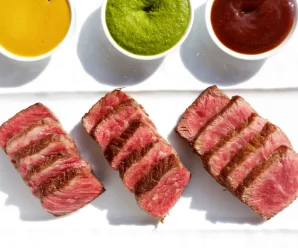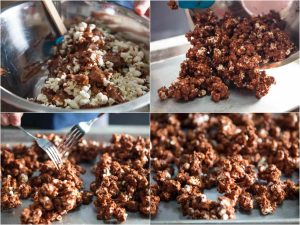In addition to producing exceptionally high-quality beef, Wagyu cattle have an abundance of marbling that contributes to their flavorful taste. As Wagyu’s umami flavour and unique tenderness are attributed to its high concentration of monounsaturated fatty acids in its tissue, the wholesale fatty acid composition of this marbling also plays a central role in its quality. In addition to adding flavour to beef, these acids also provide significant health benefits.
There is no doubt that Wagyu beef is one of the healthiest portions of beef that can be produced, both because of its lifestyle and genetics, but most importantly, because of what it contains. According to research, a wholesale diet consisting of monounsaturated fatty acids is more heart-healthy than a diet consisting of lean products. The monounsaturated to saturated fat ratio of Wagyu beef is 300% higher than that of other beef.
 It should be noted, however, that even saturated fat has a minimal impact on raising cholesterol levels compared to saturated fats found in other beef types. A higher concentration of oleic acid, which is also good for the heart, contributes to the higher proportion of MUFAs found in Wagyu beef. In addition to reducing low-density lipoprotein cholesterol, MUFAs can also increase high-density lipoprotein cholesterol, making them heart-healthy dietary fat.
It should be noted, however, that even saturated fat has a minimal impact on raising cholesterol levels compared to saturated fats found in other beef types. A higher concentration of oleic acid, which is also good for the heart, contributes to the higher proportion of MUFAs found in Wagyu beef. In addition to reducing low-density lipoprotein cholesterol, MUFAs can also increase high-density lipoprotein cholesterol, making them heart-healthy dietary fat.
The health benefits of Wagyu extend beyond just beef, as it is often compared to salmon and olive oil. Although Wagyu beef has the lowest cholesterol of any meat, it is also suspected to be anti-carcinogenic, making it the lowest cholesterol meat available. PUFAs, or Polyunsaturated Fatty Acids, reside within unsaturated fats and aid in the prevention of heart disease. Omega-3 and Omega-6 are polyunsaturated fatty acids that assist in lowering cholesterol.
In Wagyu cattle, grass intake influences their dietary composition, decreasing saturated fatty acids and increasing PUFA levels. The more grass is used in the diet. The better and higher the concentrations of polyunsaturated fatty acids and conjugated linoleic acids will be. A high level of CLA in Wagyu beef is correlated with its fat content, a food that contains the highest amount of CLA per gram. In addition to increasing Vitamin E levels, grass-fed cattle have a longer shelf life and better colour.













